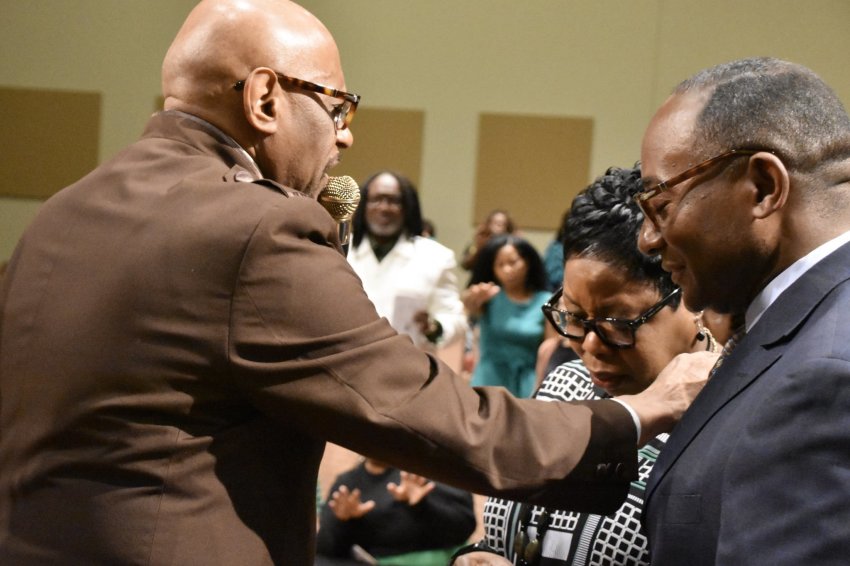Majority of black Americans remain highly religious even if they don't go to church

Even if they don’t go to church or subscribe to a particular religion, a majority of black Americans still pray and believe in God or a higher power, a new study shows.
Findings from a large-scale, nationally representative survey of 8,660 black Americans, conducted from Nov. 19, 2019, to June 3, 2020, by Pew Research Center, revealed that about one-in-five (21%) black Americans identify as atheist, agnostic or “nothing in particular.”
When the group of religiously unaffiliated black Americans is broken down, 18% of all black Americans identify as “nothing in particular.” Just 2% identify as agnostic and 1% as atheist.
Most also pray and believe in the work of evil spirits.
The survey, which is Pew’s first national large-scale survey aimed at trying to understand “distinctive aspects of the religious lives of black Americans," found that “several religious beliefs and practices are common among Black ‘nones.’”
“Nine-in-ten say they believe in God or a higher power. Just over half report praying at least a few times a month,” the report detailed. “Similar shares say they rely, at least a little, on prayer and personal religious reflection when making major life decisions, and that they believe evil spirits can cause problems in a person’s life.”
According to the data, 94% of black religiously unaffiliated Americans who identify as "nothing in particular" say they believe in God or a higher power, 60% say they pray a few times a month or more and 58% said they rely on prayer "at least a little" for major life decisions.
About half of the religiously unaffiliated group also expressed a belief in reincarnation, while just over a third say they believe prayers to their ancestors can protect them from harm.
“By these measures, religiously unaffiliated Black adults are a lot more religious than unaffiliated adults in the U.S. general population,” the Pew analysis added. “For example, they are more likely to believe in God or a higher power (90% vs. 72%) and to pray at least a few times a month (54% vs. 28%).”
The survey also showed that the percentage of religiously unaffiliated is increasing over generations. While only 5% of those in the Silent Generation identified as religiously unaffiliated, that share jumps to 11% among Baby Boomers, 33% among Millennials and 28% among Generation Z.
In an October 2019 analysis, Pew reported that only 65% of Americans identified as Christian, while those identified as religiously unaffiliated swelled to 26%.
“The changes underway in the American religious landscape are broad-based. The Christian share of the population is down and religious ‘nones’ have grown across multiple demographic groups: white people, black people and Hispanics; men and women; in all regions of the country; and among college graduates and those with lower levels of educational attainment," Pew researchers stated.
"Religious ‘nones’ are growing faster among Democrats than Republicans, though their ranks are swelling in both partisan coalitions,” Pew added. “And although the religiously unaffiliated are on the rise among younger people and most groups of older adults, their growth is most pronounced among young adults.”
It was noted that the share of Americans who say they attend religious services at least once or twice a month dropped by 7 percentage points, while the share who say they attend religious services less often if at all rose by the same figure.
The 2019 study also indicated that regular churchgoers still outnumber those who infrequently or never go to religious services among black Americans. However, the share of black Americans who say they attend religious services at least a few times a year or less has risen in the last decade.
According to the Pew analysis released last week, younger black Americans — much like younger Americans in general — are less religious than their elders. Black Millennials and members of Generation Z are twice as likely as black members of the Silent Generation to say they seldom or never attend religious services.
"Black Millennials and members of Generation Z are less likely to rely on prayer, less likely to have grown up in Black churches and less likely to say religion is an important part of their lives," the researchers wrote.
Still, though, the findings show that Black Americans are “more religious than the American public as a whole on a range of measures of religious commitment.”
The study shows that 59% of black adults — compared to 40% of all adults — say that religion is “important to them.” About 97% of black Americans and 90% of all Americans say that they believe in God or a higher power.



























